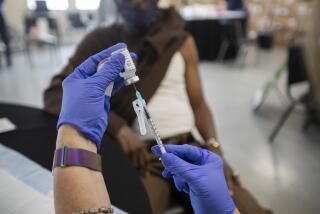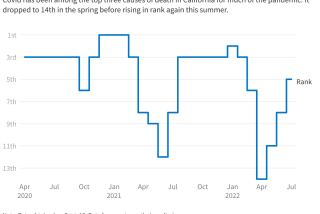Report Finds Ethnic Gap in Cancer Tests
- Share via
A UCLA report shows that whites are screened far more frequently for cancer than are Latinos and Asians.
The report, published Thursday by the UCLA Center for Health Policy Research, shows that the pattern holds true even when income levels and health insurance status are taken into account. The gap is probably the result of cultural, educational and language barriers, the researchers said.
The report is based on interviews with more than 55,000 randomly selected adults from every county in California. Researchers examined screening rates for cervical, breast, colorectal and prostate cancer among whites, Latinos, Asians, African Americans, American Indians, Native Hawaiians and Pacific Islanders.
Asians reported lower rates of screening than white people for all four of the cancers studied. Latinos reported significantly lower screening rates than whites for all but cervical cancer, as did Native Hawaiians and other Pacific Islanders, American Indians and Alaska Natives.
The survey did find progress in some areas. Overall, Californians are being screened for cancer at higher rates than the rest of the nation, somewhat remarkable, considering the large population of uninsured people in the state, researchers said.
Also, the gap between screening for blacks and whites has disappeared in the case of colorectal, cervical and breast cancers and has narrowed for prostate cancer, it said.
“I think the black community has done a lot to raise awareness, and now it looks like, even for low-income and uninsured African Americans, that their access to screening is on par with whites,” said Ninez Ponce, a researcher with the health policy center. “There is a perception that when we talk about race and ethnicity that that means black-and-white differences, but that’s not the case here. We have a very diverse population.”
One explanation for the disparities, the report found, is the lack of understanding in some ethnic communities of the purpose of cancer screenings. Screenings are intended to pick up cancer that may not have created noticeable health problems yet. But one of the most common reasons those surveyed gave for not being screened is that they hadn’t experienced health problems.
“This misconception is particularly prevalent among the ethnic and racial groups least likely to get recommended screenings,” the report said.
The researchers used their findings to make an argument against an upcoming ballot proposal, Proposition 54, which would ban the state from collecting most kinds of racial data. Although the data were collected two years ago and were not affected by the measure, they show the need to continue collecting this sort of information, the researchers said.
“Clearly, targeting ... the specific racial and ethnic groups most at risk remains a necessary step to save lives in California and reduce the burden of late-stage cancer on the state’s health care system,” the report said.
Ward Connerly, the UC regent sponsoring Proposition 54, maintained that the proposition makes an exemption for collection of medical research data.
“You say: ‘It doesn’t apply, it doesn’t apply, it doesn’t apply’ and it just doesn’t matter. They keep on saying that it does,” he said. “Why in the name of God would somebody draft an initiative that would kill anybody?”
Some health researchers remain concerned about the proposition.
“The fact is, there are substantial disparities in health care regarding ethnicities,” said Mark Litwin, professor of urology and public health at UCLA.
“The only way to eliminate those kinds of disparities is, know they exist and then research why. Sometimes it’s genetic, sometimes it’s language, sometimes it’s culture.”
Some cancers, such as cervical cancer, are readily treatable in their early stages.
Yet Asian women, and to a lesser extent Latino women, remain at an increased risk of dying unnecessarily, the report said, because they are not tested regularly.
Asians, Native Hawaiians and Pacific Islanders were the least likely to have received pap tests in the last three years.
More to Read
Sign up for Essential California
The most important California stories and recommendations in your inbox every morning.
You may occasionally receive promotional content from the Los Angeles Times.










